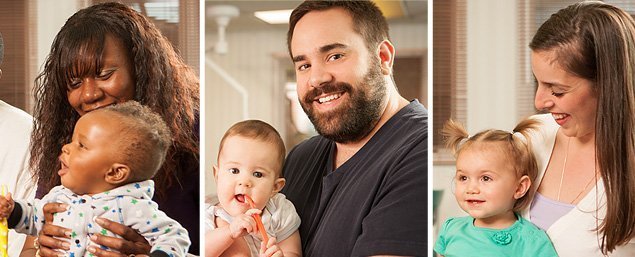Paci, Binky, Nukie. Whatever cute name you and your child may have for it, chances are that a pacifier will be a part of every child's life at some point. Many parents and caregivers wonder if pacifiers can cause problems for baby's developing teeth and mouth. Today, TeethFirst! weighs in on this topic.
Why do babies use pacifiers?
Sucking is a normal instinct for babies. The use of a pacifier makes them feel secure and helps them calm themselves when they are upset. The American Academy of Pediatric Dentistry says that most babies will stop using a pacifier on their own between the ages of two and four. During those first few years of life, using a pacifier is okay and will not damage a child's mouth if used correctly.
Tips for using pacifiers correctly
Parents and caregivers should be careful when picking out a pacifier for their child.
Parents should:
- Make sure the pacifier is made of one single piece. There should be no small parts that could come off and choke your baby.
- Look for "orthodontically correct" pacifiers. These are specially designed to decrease the risk of dental problems that can be caused by pacifiers. Orthodontically correct pacifiers are sold in stores or your child’s dentist can help you find one.
- Ensure that the pacifier is the right size for your baby's mouth. Read the labels to see what the correct sizes are.
- Never dip pacifiers in honey or sugar. This can lead to tooth decay.
- The American Dental Association says that tooth decay can also begin when cavity-causing bacteria pass from saliva in a mother or caregiver’s mouth to the infant. When the mother or caregiver puts the baby’s feeding spoon in her mouth, or cleans a pacifier in her mouth, the bacteria can be passed to the baby.
Using a pacifier too often or for a long time can cause problems
While using a pacifier is a good thing for your baby in early years before adult teeth come in, if a child uses a pacifier very frequently for a long time, it can cause problems.
If a child uses a pacifier too much, it can cause:
- The top front teeth to slant out
- The bottom front teeth to tilt in
- Narrowing of the roof of the mouth
- The upper and lower jaws to line up incorrectly
- Speech delays because the child cannot practice talking if there is a pacifier in his or her mouth
How to break the pacifier habit
If your child has a hard time stopping the use of a pacifier, you can help them give it up.
- If your child is old enough to understand, simply explain to him or her that letting go of the pacifier is a good idea to keep their teeth and mouth healthy.
- Children often use pacifiers when feeling insecure or needing comfort. Focus on correcting the cause of the anxiety and provide comfort to your child.
- You can also gradually reduce the amount of time your child is allowed to use the pacifier until it is gone completely. For example, they might only be allowed to use the pacifier when they are in their bedroom. Then only at night. Then only in their crib.
- Use rewards and praise as much as you can. (Stickers or small toys – no sweets, which can cause tooth decay.)
- If these strategies do not work, talk to your dentist about other ways to help. Some dental offices will help by letting the child bring in the pacifier to give to the “binky fairy,” and get a small toy in return for it. The staff may have other ideas and suggestions that can help you.






